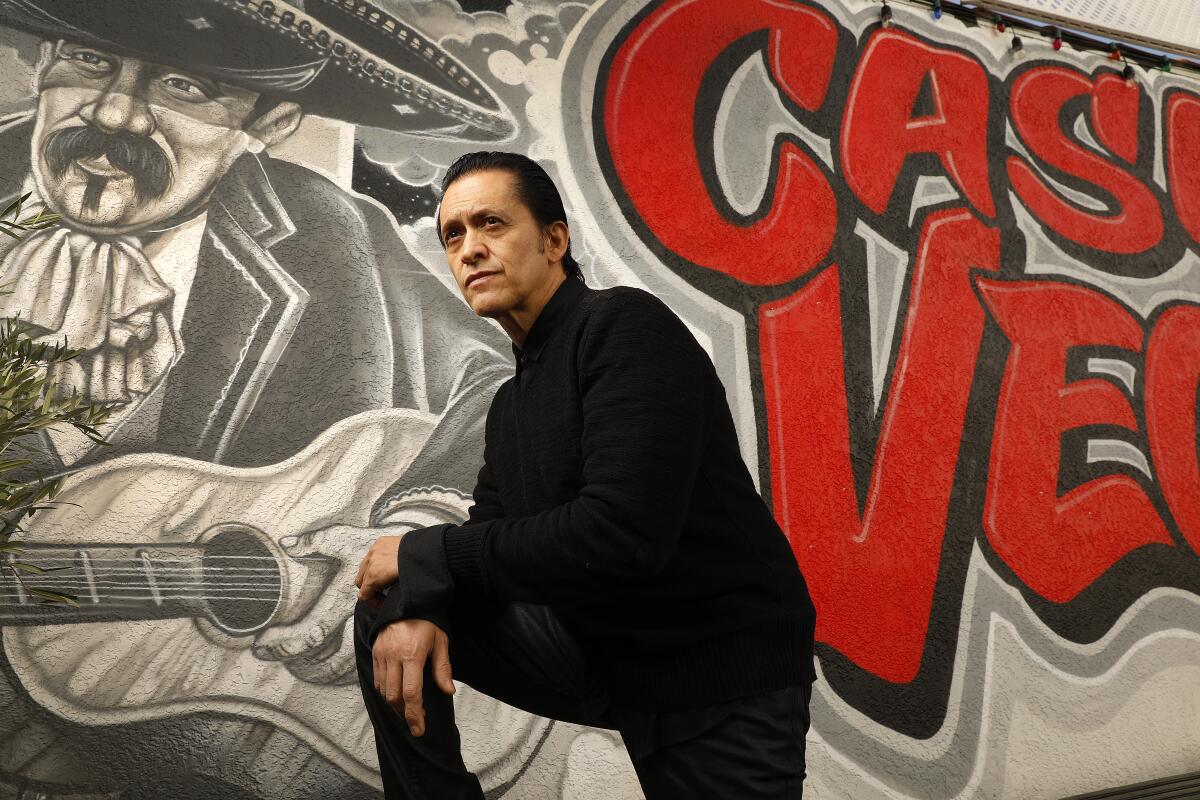How real-world magic graces the making of Clifton Collins Jr.’s ‘Jockey’

- Share via
There’s movie magic such as the camera angles, editing and sound that the ultra-low-budget indie “Jockey” uses to simulate its characters’ participation in horse races. Then, if productions get lucky, there’s other magic in moviemaking.
“Those first four days of shooting — every day, we had some unexplainable thing happen,” says star and executive producer Clifton Collins Jr., “kicking off with a giant meteor splitting the sky on Day 1. Then, on our wrap day, a giant meteor splitting the sky. Really bookended it. We all saw it.”
With a total crew of 10 and only 20 days to shoot, the production happily welcomed all auspicious omens. In a scene with Collins’ and Molly Parker’s characters at a rodeo, the actress improvised a prediction that the next bull rider would fall off in four seconds. Lo and behold ...
There was also the alchemy of cast and crew in sync. Collins says “by the third day,” he knew that he and cinematographer Adolpho Veloso were on the same page — key to a movie being shot with a hand-held camera, on the fly. Collins had to be entirely in the flow; he’s an executive producer but he was much more active than that title often implies, including being in on rewrites “every night.” His character is in every scene.
Collins plays Jackson Silva, a respected veteran of the circuit (when the interviewer says, “Not Bill Shoemaker, but well known,” the actor with more than 120 credits says, “Like my career!”). Jackson’s body is starting to fail him. Years of broken bones and subsistence living have him struggling as young upstart jockey Gabriel (Moisés Arias) arrives, claiming to be his son. Meanwhile, his long professional relationship with trainer Ruth (Parker) may evolve as she finds a horse that could take them to the next level.
It’s a story of a man in transition, staggering toward the finish line.
“You wonder, ‘Where are you going? What have you created?’ It’s like that line from [the song] ‘Hurt’: ‘My empire of dirt,’ Trent Reznor,” says Collins.
The movie — his second with writers Greg Kwedar and Clint Bentley, who also directed — isn’t about the glory; it’s about the soul of the profession: the lifers and what they go through to stay in the saddle. Collins spent weeks with jockeys, doing grunt work in the barn, learning the lingo, earning their trust.
“A lot of these guys might race two or three times a day. If they get hurt in Race 2, if they can hide it well enough, they’ll be in Race 3. One of the main guys, I asked him, ‘Sometimes, do you break bones?’ He said, ‘Oh yeah, you break bones all the time. This bone, that bone, this bone.’ ‘So you got hurt a bunch?’ ‘Oh, no, mister. I never got hurt. Don’t you worry none. You fall off, you got an ambulance right behind you. They’ll give you somethin’, make you feel real nice. You’ll be back on that track in no time.’ ”
In one unexpectedly emotional scene, Jackson admits how badly injured he is. In another bit of fortune, Collins and Veloso’s camera simultaneously finds the light in the dim trailer to reveal a tear.
Collins says, “He’s holding in so much pain. Normally, jockeys never cry, hiding the injuries, being stoic. His emotions are so controlled, by necessity.”
Collins has been No. 1 on the call sheet before (in 2009’s “The Perfect Game,” for instance), but at age 51, this is the first feature he has carried so completely. He has been rewarded, collecting an acting prize from the Sundance Film Festival. Despite all the research and the long hours, though, he readily acknowledges a debt to all those mystical happenings — as when the production went to a national park hoping to capture footage of wild horses. There were no wranglers, no real plan, just the crew and Collins (in his costume cowboy boots) “humping gear over all these rocks,” he says.
“We get up there and see these baby mustangs, we get a shot of me watching them; it was OK. So we’re like three miles from base camp, sun’s going down — ‘Hey guys, I’m goin’ back down, can’t be running around in the dark in these cowboy boots.’ This is Day 5. So I’m heading back, I’m deep in thought by the edge of the ravine, just kind of giving thanks — ‘Thank you for this movie magic we’ve had for four days’ — I squatted by the water and I heard ‘ka-PLOK, ka-PLOK, ka-PLOK.’ I slowly looked up and there was this big, beautiful, dominant mare. A white mare. Staring me down.
“She comes at me, her hair’s up. I’m thinking she’s coming to take me somewhere. She stops, turns around — and her four little ones came out and they crossed. I turn around and sure enough, Alfonso’s on his belly like 30 feet behind me. ‘Oh, my God, did we get that?’ People were in tears.”
More to Read
From the Oscars to the Emmys.
Get the Envelope newsletter for exclusive awards season coverage, behind-the-scenes stories from the Envelope podcast and columnist Glenn Whipp’s must-read analysis.
You may occasionally receive promotional content from the Los Angeles Times.











